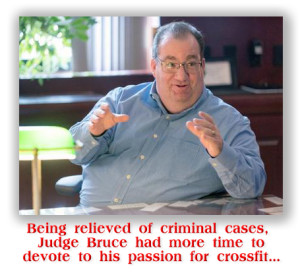We post news and comment on federal criminal justice issues, focused primarily on trial and post-conviction matters, legislative initiatives, and sentencing issues.

ADDING INSULT TO INJURY
Lonnie Hubbard is a prudent man. Although he is not yet 50, he has been saving for his golden years for a long time.
 Unfortunately, his prudence did not extend into his professional life. Through his drug store, Rx Discount of Berea, PLLC, Lonnie provided large quantities of oxycodone to people who craved it but lacked the prescriptions that many pharmacists – at least those operating inside the law – normally require.
Unfortunately, his prudence did not extend into his professional life. Through his drug store, Rx Discount of Berea, PLLC, Lonnie provided large quantities of oxycodone to people who craved it but lacked the prescriptions that many pharmacists – at least those operating inside the law – normally require.
Lon also got into wholesaling, providing pseudoephedrine to illegal methamphetamine manufacturers.
In the vernacular, Lonnie ran a “pill mill.”
Business was good for a long time. Lonnie used over $2 million of the company’s income to pay for two homes, multiple Corvettes and a Mercedes, a boat and jet skis. At the same time, he set up an IRA to save for retirement.
Unfortunately for Lon, his fast and loose sales practices finally caused his money train to jump the tracks. After a trial, he was convicted in 2017 on 71 counts of a 73-count superseding indictment and sentenced to 360 months in prison. The court also ordered him to forfeit millions of dollars he had obtained through his illegal drug distribution.
That’s where today’s saga begins. Lonnie had $427,518 in his IRA when the government seized it to apply to his forfeiture obligation. The nature of a traditional IRA, of course, is that one is not taxed on the funds put into an IRA, instead paying taxes on the money when it is withdrawn during retirement. If money is withdrawn prior to retirement age, taxes and a penalty are paid.
 After Lonnie’s Uncle Sam seized the IRA, the IRS suggested that the seizure qualified as “income” for Lonnie that he should have paid taxes on from prison. The tax court agreed and ordered him to pay over $180,000 in taxes and penalties on the IRA he had lost.
After Lonnie’s Uncle Sam seized the IRA, the IRS suggested that the seizure qualified as “income” for Lonnie that he should have paid taxes on from prison. The tax court agreed and ordered him to pay over $180,000 in taxes and penalties on the IRA he had lost.
This week, the 6th Circuit reversed. The Circuit ruled that because Lon had forfeited his IRA under the district court’s forfeiture order, the law made the IRS—not Lon—the owner of the IRA. The IRS thus gained “the kind of control over this account that any normal owner would possess” and did so – under the “relation back” doctrine (that holds that the government becomes the owner of forfeited funds as of the moment the defendant commits his crime – it already owned the IRA when it liquidated the funds by “[e]xercising this ownership interest.”
The 6th held:
We fail to see why Hubbard must pay taxes on the IRS’s choice to withdraw the funds given that he no longer owned or controlled the IRA. From a bird’s-eye view, Hubbard obtained no “economic gains” (that is, income) when the IRS withdrew the IRA funds. Most people would have described the earlier forfeiture of the IRA as an economic loss—not an economic gain. And the later withdrawal of funds also did not reduce any “indebtedness” that Hubbard owed the IRS. Since the forfeiture order merely transferred ownership of the IRA to the IRS, that order no more created a “debt” than did the forfeiture of Hubbard’s homes and cars. And because Hubbard did not own the IRA at the time of the withdrawal, he did not receive (and had no right to receive) its funds. Just as “the difference between what is yours and what is mine” matters for the forfeiture laws, so too it should matter for the tax laws. The IRA was not Hubbard’s. He should no more have to pay taxes on its funds than a person randomly selected from the Kentucky voter rolls.
Lonnie still has 15 years to serve on his sentence. He will walk as a free man in 2041, just in time to start collecting social security.
Hubbard v. Commissioner, Case No. 24-1450, 2025 U.S. App. LEXIS 6389 (6th Cir. Mar. 19, 2025)
– Thomas L. Root























